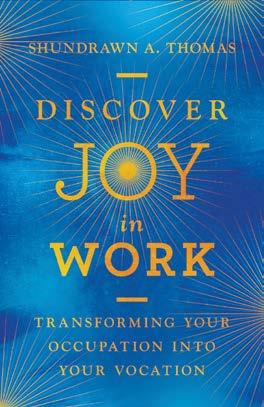
3 minute read
Come Alive Through Your Work
Come Alive Through Your Work
By April Yamasaki
Discover Joy in Work: Transforming Your Occupation into Your Vocation by Shundrawn A. Thomas (InterVarsity Press, 2019 224pp, $22.00 US)
Asmall group of corporate executives, leaders of nonprofits, and other professionals gathered together to encourage one another in their personal and professional lives.
They began by introducing themselves, sharing about their families, their work, and what they hoped for the future. But the last one to share asked a question that changed the direction of the group’s conversation: “Are you happy?” They were all well accomplished in their respective fields, but did they also find joy in their work? That question and that meeting led Shundrawn Thomas to a key work-changing and lifechanging decision: to transform his occupation into his vocation. As he sought to put this into practice, he found joy in his work in the world of finance.
In his new book, Thomas unpacks how anyone can transform their occupation into their vocation, and how that leads to joy in work. The path he outlines applies not only to professional employment, but to all kinds of work: paid and unpaid, on the job and at home, for business people, social workers, hair stylists, and everyone, whether you’re cleaning out the garage or whatever you do. Discover Joy in Work is clearly laid out in three sections: (1) Your Workplace; (2) Your Work Ethic; (3) Your Work Life.
In each section the author explains key vocational principles in a calm, sure, voice:
“Work is not a burden but a blessing. It builds strength of character and gives you pleasure that cannot be found in leisure activity.”
“I must serve the mission and not the money.”
“Creating value through your work is one of the greatest joys in life.”
Throughout the book, the author offers examples from his own work life, from family members, mentors, and co-workers, with references to Dr. Martin Luther King Jr., industrialist Henry Kaiser, Mother Teresa, and other notable figures. At the end of each

chapter, he summarizes his key points. Along the way there are a few surprises. For example, in the author’s discussion of “your workplace,” I expected a thoughtful consideration of job descriptions, working conditions, management structures, and other characteristics of the physical work environment.
Instead Thomas explores the workplace from a different angle, focusing less on the physical organization and structure of work and more on what it means to manage ourselves within our work environment. That includes having realistic expectations, a constructive attitude, developing the ability to prioritize tasks, partner with others, and much more. I’ve often seen the quip that showing up is the first secret of success, but Thomas goes deeper and rightly observes, “Work, it turns out, is more than just showing up.”
While some understand employment as an exchange of time and skills for a paycheck, Thomas insists, “It is essential to view the time we commit to our work as an investment rather than an exchange.”
While having a good “work ethic” has often been explained to me as working hard and being punctual, Thomas expands it to include building character, practicing generosity, and empowering others. These and many other insights make Discover Joy in Work a joy to read and a powerful aid in turning your current occupation into your vocation. ◆
April Yamasaki is resident author with Valley CrossWay Church in Abbotsford, B.C.; editor of Purpose, a monthly magazine of everyday inspiration; and author of Four Gifts, Sacred Pauses, and other books on Christian living.







